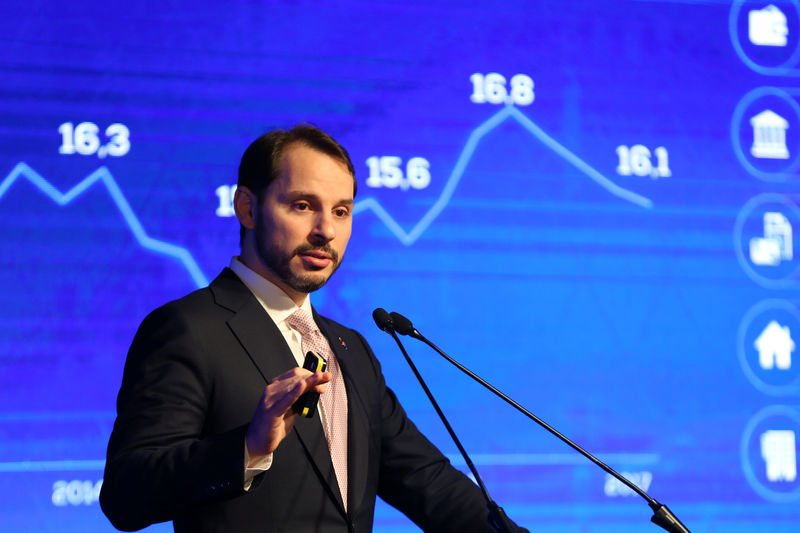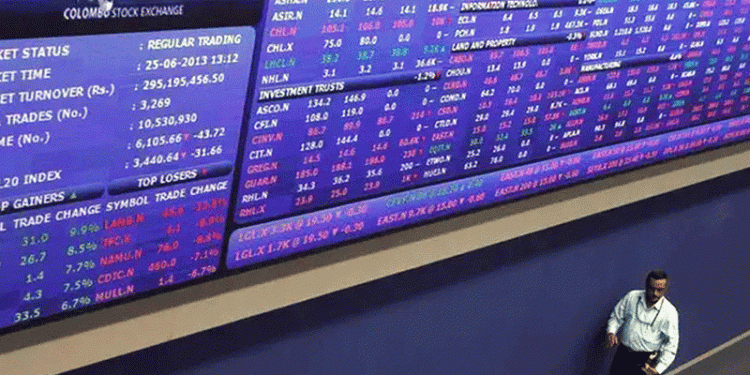 © Reuters. Turkish Treasury and Finance Minister Albayrak speaks during a presentation to announce medium-term economic programme in Istanbul
© Reuters. Turkish Treasury and Finance Minister Albayrak speaks during a presentation to announce medium-term economic programme in IstanbulBy David Dolan and Ali Kucukgocmen
ISTANBUL (Reuters) – Investors had hoped Turkey would announce a sweeping plan to help its banks when Finance Minister Berat Albayrak rolled out a new economic program this week. What they got fell far short of that.
Albayrak announced sharply lower growth forecasts for this year and next and promised $12 billion in new savings and revenue for 2019, but failed to mollify investors who wanted to see Ankara move quickly to stem worries about the banking sector.
Turkey’s lira
For years Turkish companies, particularly construction firms, have gorged themselves on cheap euro and dollar loans. But the lira crisis has driven up the cost of servicing that debt, meaning lenders face a wave of defaults.
“It’s quite clear that there will be defaults and there will be a need for restructuring in the corporate sector,” said Per Hammarlund, chief emerging market strategist at SEB.
“The medium-term economic program would have been a perfect opportunity to present a more actionable, clearer program for how they intend to deal with potential problem loans.”
Turkey has a large and sophisticated banking sector that is dominated by a mix of listed lenders – including Isbank (IS:), Garanti (IS:) and Akbank (IS:) – and state-owned banks such as Ziraat and Halkbank (IS:). Garanti is a unit of Spain’s BBVA (MC:) which, along with Italy’s UniCredit (MI:), France’s BNP Paribas (PA:), Dutch bank ING (AS:) and Britain’s HSBC (L:), are the foreign banks most exposed to Turkey.
That exposure is significant. JPMorgan (NYSE:) estimates that the private sector has around $146 billion in external debt maturing in the year to July 2019. In August Moody’s downgraded its ratings on 20 financial institutions, saying Turkey’s operating environment had deteriorated beyond previous expectations.
Erdogan, a self-described “enemy of interest rates”, wants to keep borrowing costs low and credit flowing to companies, particularly construction firms. His comments about monetary policy have undermined the central bank’s credibility and caused much of the sell-off.
The central bank last week hiked interest rates by a greater-than-expected 6.25 percent points, although the lira remains under pressure.
‘UNDERWHELMING’
In a decade and a half in power, Erdogan has transformed Turkey, building roads, hospitals, high speed trains and high rise apartments. But economists say the boom years focused more on consumption rather than productivity – that Turkey built shopping malls when it should have been investing more in factories and its education
Albayrak, President Erdogan’s son-in-law, failed to signal an unambiguous break from the emphasis on credit-fuelled growth, saying a main goal was to establish 5 percent annual growth from 2021 onwards.
Markets had speculated that he would announce a “bad bank” vehicle to take over souring debt. But the economic plan made no mention of such a move and the head of the banking watchdog said there would be no transfer of problem loans.
“Albayrak failed to provide a convincing case that there has been a broad shift back to orthodox policymaking,” Jason Tuvey of Capital Economics said in a note to clients. “Hopes that the government would announce the creation of a ‘bad bank’ to absorb souring loans were also disappointed. Overall then, a bit underwhelming.”
Given their reliance on external funding, Turkish banks are exposed to refinancing risk. Ratings agency Fitch has that some $102 billion of loans are maturing in the next 12 months, and that the refinancing requirement is probably around $55 billion.
The government has said it does not expect problems in the banking sector and Albayrak on Thursday dismissed concerns about refinancing risks. Investors are less certain. Istanbul’s index of bank stocks is down 40 percent this year ().
As of July, some 37 percent of Turkish banks’ loans – $144.20 billion – were denominated in foreign currency, according to data from the BDDK regulator, with 15 percent of those short term.
BAD LOANS
Non-performing loans (NPLs) account for just 3.05 percent of all debt, according to BDDK data. But investors are wary.
“Two important issues for the banking system are liquidity – how much foreign financing they can get to roll over maturing external debt – and second, how will the NPL ratios develop,” said Inan Demir, an emerging markets strategist at Nomura.
Of particular concern is the banking sector’s exposure to construction, real estate and power utilities. The tumbling lira, coupled with rising energy prices, has squeezed power firms, once seen as a darling of foreign investors.
Turkey has already seen some high-profile restructuring: Yildiz Holding, the owner of global food brands including Godiva chocolate agreed to refinance $5.5 billion in May.
Some banks have started to sell project finance loans to foreign lenders to free up cash.
While questions remain around banks and diplomatic relations with the United States, the extent of the lira sell-off has made Turkey attractive to some.
“We are relatively optimistic on having a macro adjustment in Turkey, the big question is whether the central bank will be given the space to keep rates high,” said Brett Diment, head of Emerging Market and Sovereign Debt at Standard Life (LON:) Aberdeen, just returned from a trip to Turkey.
“We are now at benchmark weight having been underweight for quite a while,” adding “The currency is pretty undervalued.”
($1 = 6.2690 liras)
Source: Investing.com



























